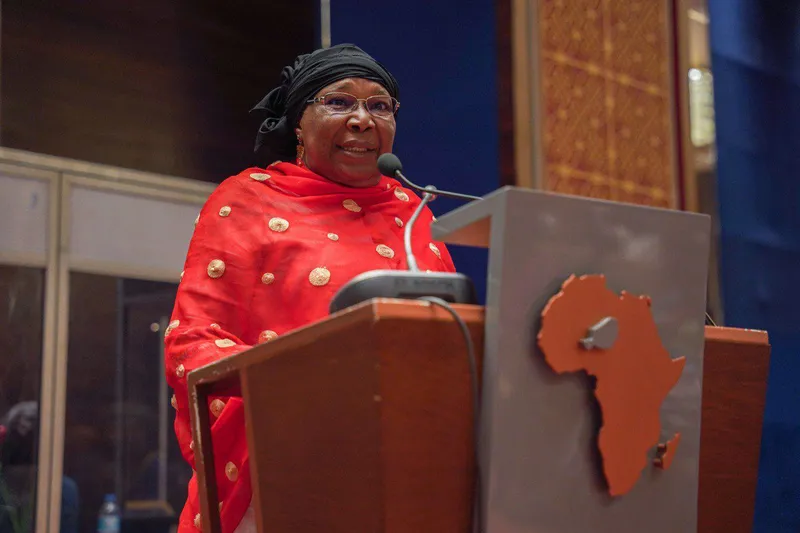Women have always been at the forefront of people’s struggles in Niger. The example of Saraounia Mangou is emblematic and became a film. In the 1890s, while most of the chiefs of the West African country were submitting to colonial power, the chief and priestess of the Hausa people led the fight against the French troops of the Voulet-Chanoine colonial mission, also called the Central African-Chad Mission.
More than a century later, history has repeated itself. If that overthrew former president Mohamed Bazoum on July 26, 2023, women also took to the streets of the capital Niamey and played a leading role in expelling the 1,500 French soldiers from the country.
This is what Hassia Issa, a member of the NGO Millennium Africa, which works for the rights of Nigerien women, explains. “From the beginning to the end, women were involved in patriotic participation and Niger participation. They mobilized to hold meetings. They mobilized to take care of various points that were blocked,” she says.
“It wasn’t just young people and men who contributed. Women were there. Women have been participating in the process since July 26,” adds Issa.
Political activism takes place in a difficult context for women in Niger. The violent actions of Islamic fundamentalist groups on the triple border between Niger, Burkina Faso, and Mali have led to the massive displacement of rural families, leaving thousands of women and children homeless.
“Women in rural areas are all worried because they are the ones living with terrorism. They face terrorism and social injustice. That’s why, as soon as there were changes, they mobilized and converged on the capital, Niamey, to support the authorities, their families, and their sisters who are on the frontline of the struggle,” says the leader of the NGO Millennium Africa.
She added, “They have contributed because they face the reality we are experiencing in the Sahel. The constraints related to terrorism and attacks on villages target rural women as their first victims. It’s a struggle that requires everyone to work together. We need to know who is financing these terrorists, who give them weapons, dollars, and euros. That has to stop. Our people in the villages should live in peace.”
Hassia Issa advocates for greater female participation in Niger’s political decision-making processes – Pedro Stropasolas/Brasil de Fato
Threats from groups considered to be terrorists were the justification for French and US military intervention in the region starting in 2013, with the establishment of Operation Barkhane and the G-5 Sahel project. However, the presence of foreign troops has not resulted in an effective fight against Islamist militias.
Today, the main force fighting terrorism in Niger has been the Alliance of Sahel States, a military, political and economic pact signed with the allied governments of Mali and Burkina Faso, African countries that have also recently experienced military coups supported by the population.
Rural women play an important role, donating money and products to solidarity funds aimed at the country’s sovereignty. Hadjara Ali Soumaila, from the Confederation of Women Combatants and Pan-African Leaders, explained the kind of work she develops.
“Nowadays, terrorism involves almost every family in Niger. And since the coup, these women have become strong—very strong. Today, they are committed to supporting the CNSP [military junta], because now, with the CNSP, we can sleep in peace. We can do our work. We can get food for our orphaned children,” says Soumaila.
Women’s strength against sanctions
Soon after the coup, the countries of the West African Economic Community were pressured to sanction Niger. The closure of the borders with Nigeria and Benin led to an increase in the price of products and food. Power cuts and a lack of medicines in drug stores have forced women to give birth in deplorable conditions.
In this context, the Confederation of Women Combatants and Pan-African Leaders, of which Hadjara is one of the leaders, was at the forefront of the struggle that put an end to sanctions.
“Before the coup, it was a struggle for resilience, because we wanted the emancipation of Nigerien women. It was a fight for resilience because we wanted to empower Nigerien women. Nigerien women who didn’t go to school, who lost their husbands, who had no income and didn’t work, and so tried to make ends meet in small shops through local products. But now it has become a struggle to save the country,” said the leader.

Women’s and the rural population’s purchasing power has decreased due to the scarcity and rising prices of basic-needs products/ Animata Gado
Hassia Issa believes that, despite the progress they achieved, women still face difficulties participating in politics and decision-making proces
“In politics, in Niger and the Sahel in general, you need a lot of financial resources to be able to do what you want, to be able to campaign and convince people to vote for you. So, the obstacle of financial resources and social norms limits women’s participation. Because not all husbands agree to women taking part in evening political debates with political parties. And women’s leadership is also limited because, at the decision-making level of these political parties, it is men who dominate,” she explains.
“The women of Niger, the women of Mali, the women of the AES [Alliance of Sahel States] cannot do it alone. We need all the women of West Africa and abroad, from Brazil and South Africa, to support us and work together with us. Let’s go together because that’s how we build our way,” concludes Issa.
Edited by: Dayze Rocha

